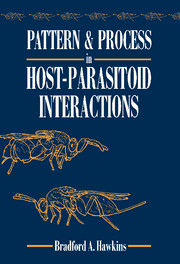3 - Parasitoid species richness
Published online by Cambridge University Press: 04 May 2010
Summary
Introduction
The simplest question that one can ask about a parasitoid community is, how big is it? Despite the large amount of data on the species richness of parasitoid complexes that had been accumulated during the first half of the century, it was not until the early 1960s that attention turned to explaining why some parasitoid communities were species rich, whereas others were relatively species poor. Askew's (1961) seminal work on the parasitoids of British Cynipidae was the first to compare a series of related host species to explicitly examine factors that influence the size and structure of a network of parasitoid complexes. Askew and his collaborators subsequently used this comparative approach to examine variability in parasitoid species richness and composition in cecidomyiid galls (Askew & Ruse, 1974) in a wide range of leaf mines (Askew & Shaw, 1974; Askew, 1975) and in sawflies (Askew & Shaw, 1986).
The most obvious result arising from even a cursory comparison of parasitoid complexes is that the number of parasitoids associated with individual herbivore species is highly variable. Some herbivorous insects appear to be virtually free of parasitoids (e.g. Ahmad, 1974; Janzen, 1975), whereas others support more than 50 species (e.g. Fahringer, 1941; Harman & Kulman, 1973; Delucchi, 1982). In this chapter I extend the taxonomically restricted analyses pioneered by Askew and his colleagues and examine ecological, biological and taxonomic characteristics of hosts and their foodplants that may at least partially account for this variability.
- Type
- Chapter
- Information
- Pattern and Process in Host-Parasitoid Interactions , pp. 23 - 69Publisher: Cambridge University PressPrint publication year: 1994



